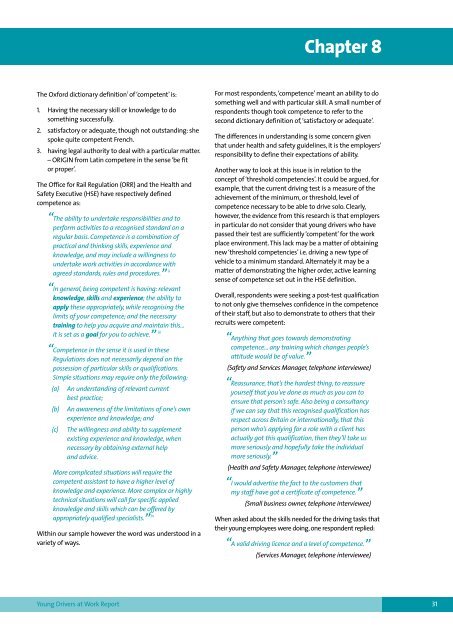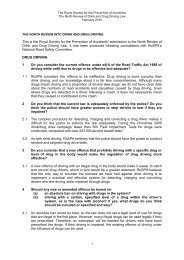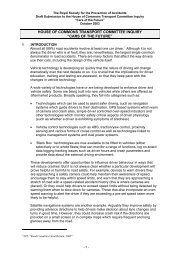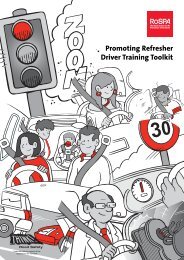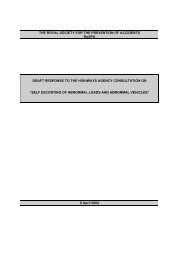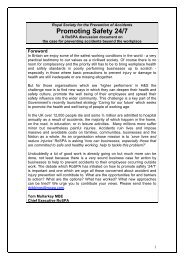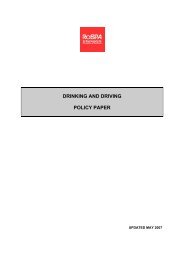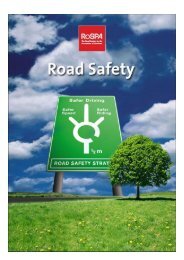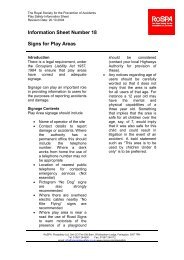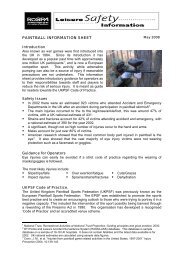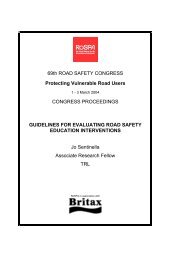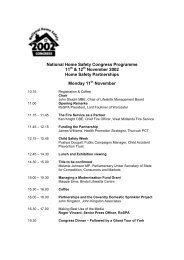RoSPA Young Drivers at Work Report
RoSPA Young Drivers at Work Report
RoSPA Young Drivers at Work Report
Create successful ePaper yourself
Turn your PDF publications into a flip-book with our unique Google optimized e-Paper software.
Chapter 8<br />
The Oxford dictionary definition i of ‘competent’ is:<br />
1. Having the necessary skill or knowledge to do<br />
something successfully.<br />
2. s<strong>at</strong>isfactory or adequ<strong>at</strong>e, though not outstanding: she<br />
spoke quite competent French.<br />
3. having legal authority to deal with a particular m<strong>at</strong>ter.<br />
– ORIGIN from L<strong>at</strong>in competere in the sense ‘be fit<br />
or proper’.<br />
The Office for Rail Regul<strong>at</strong>ion (ORR) and the Health and<br />
Safety Executive (HSE) have respectively defined<br />
competence as:<br />
“The ability to undertake responsibilities and to<br />
perform activities to a recognised standard on a<br />
regular basis. Competence is a combin<strong>at</strong>ion of<br />
practical and thinking skills, experience and<br />
knowledge, and may include a willingness to<br />
undertake work activities in accordance with<br />
agreed standards, rules and procedures. ”<br />
ii<br />
“In general, being competent is having: relevant<br />
knowledge, skills and experience; the ability to<br />
apply these appropri<strong>at</strong>ely, while recognising the<br />
limits of your competence; and the necessary<br />
training to help you acquire and maintain this...<br />
it is set as a goal for you to achieve. ”<br />
iii<br />
“Competence in the sense it is used in these<br />
Regul<strong>at</strong>ions does not necessarily depend on the<br />
possession of particular skills or qualific<strong>at</strong>ions.<br />
Simple situ<strong>at</strong>ions may require only the following:<br />
(a) An understanding of relevant current<br />
best practice;<br />
(b) An awareness of the limit<strong>at</strong>ions of one’s own<br />
experience and knowledge; and<br />
(c) The willingness and ability to supplement<br />
existing experience and knowledge, when<br />
necessary by obtaining external help<br />
and advice.<br />
“More complic<strong>at</strong>ed situ<strong>at</strong>ions will require the<br />
competent assistant to have a higher level of<br />
knowledge and experience. More complex or highly<br />
technical situ<strong>at</strong>ions will call for specific applied<br />
knowledge and skills which can be offered by<br />
appropri<strong>at</strong>ely qualified specialists. ”<br />
iv<br />
Within our sample however the word was understood in a<br />
variety of ways.<br />
For most respondents,‘competence’ meant an ability to do<br />
something well and with particular skill. A small number of<br />
respondents though took competence to refer to the<br />
second dictionary definition of,‘s<strong>at</strong>isfactory or adequ<strong>at</strong>e’.<br />
The differences in understanding is some concern given<br />
th<strong>at</strong> under health and safety guidelines, it is the employers’<br />
responsibility to define their expect<strong>at</strong>ions of ability.<br />
Another way to look <strong>at</strong> this issue is in rel<strong>at</strong>ion to the<br />
concept of ‘threshold competencies’. It could be argued, for<br />
example, th<strong>at</strong> the current driving test is a measure of the<br />
achievement of the minimum, or threshold, level of<br />
competence necessary to be able to drive solo. Clearly,<br />
however, the evidence from this research is th<strong>at</strong> employers<br />
in particular do not consider th<strong>at</strong> young drivers who have<br />
passed their test are sufficiently ‘competent’ for the work<br />
place environment. This lack may be a m<strong>at</strong>ter of obtaining<br />
new ‘threshold competencies’ i.e. driving a new type of<br />
vehicle to a minimum standard. Altern<strong>at</strong>ely it may be a<br />
m<strong>at</strong>ter of demonstr<strong>at</strong>ing the higher order, active learning<br />
sense of competence set out in the HSE definition.<br />
Overall, respondents were seeking a post-test qualific<strong>at</strong>ion<br />
to not only give themselves confidence in the competence<br />
of their staff, but also to demonstr<strong>at</strong>e to others th<strong>at</strong> their<br />
recruits were competent:<br />
“Anything th<strong>at</strong> goes towards demonstr<strong>at</strong>ing<br />
competence... any training which changes people’s<br />
<strong>at</strong>titude would be of value. ”<br />
(Safety and Services Manager, telephone interviewee)<br />
“Reassurance, th<strong>at</strong>’s the hardest thing, to reassure<br />
yourself th<strong>at</strong> you’ve done as much as you can to<br />
ensure th<strong>at</strong> person’s safe. Also being a consultancy<br />
if we can say th<strong>at</strong> this recognised qualific<strong>at</strong>ion has<br />
respect across Britain or intern<strong>at</strong>ionally, th<strong>at</strong> this<br />
person who’s applying for a role with a client has<br />
actually got this qualific<strong>at</strong>ion, then they’ll take us<br />
more seriously and hopefully take the individual<br />
more seriously. ”<br />
(Health and Safety Manager, telephone interviewee)<br />
“I would advertise the fact to the customers th<strong>at</strong><br />
my staff have got a certific<strong>at</strong>e of competence. ”<br />
(Small business owner, telephone interviewee)<br />
When asked about the skills needed for the driving tasks th<strong>at</strong><br />
their young employees were doing,one respondent replied:<br />
“A valid driving licence and a level of competence. ”<br />
(Services Manager, telephone interviewee)<br />
<strong>Young</strong> <strong>Drivers</strong> <strong>at</strong> <strong>Work</strong> <strong>Report</strong><br />
31


